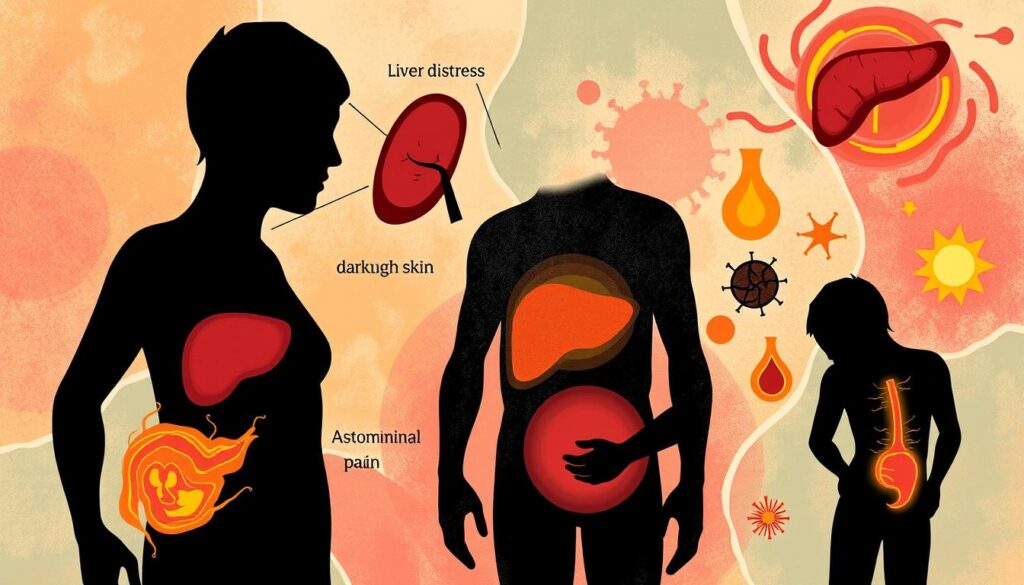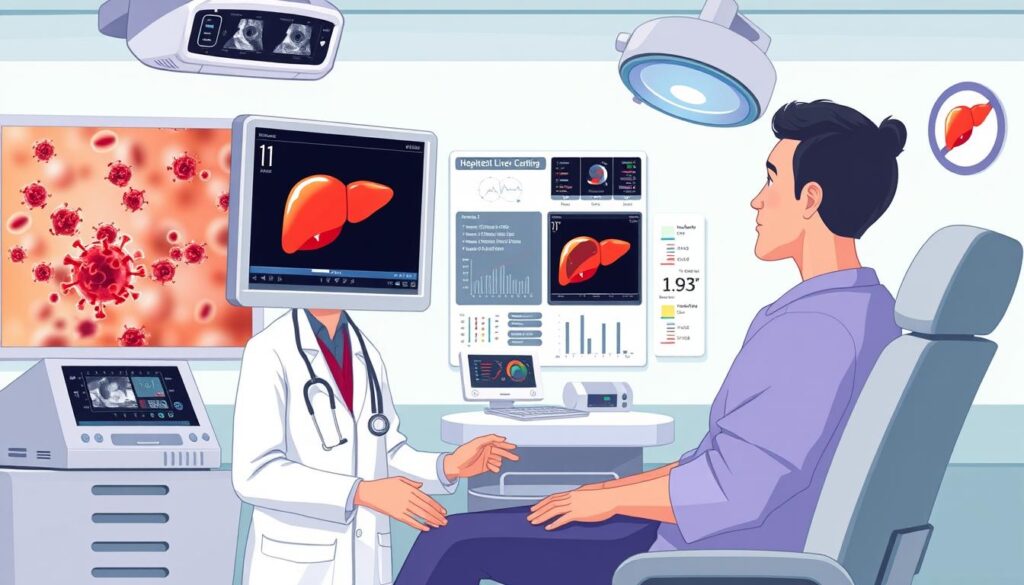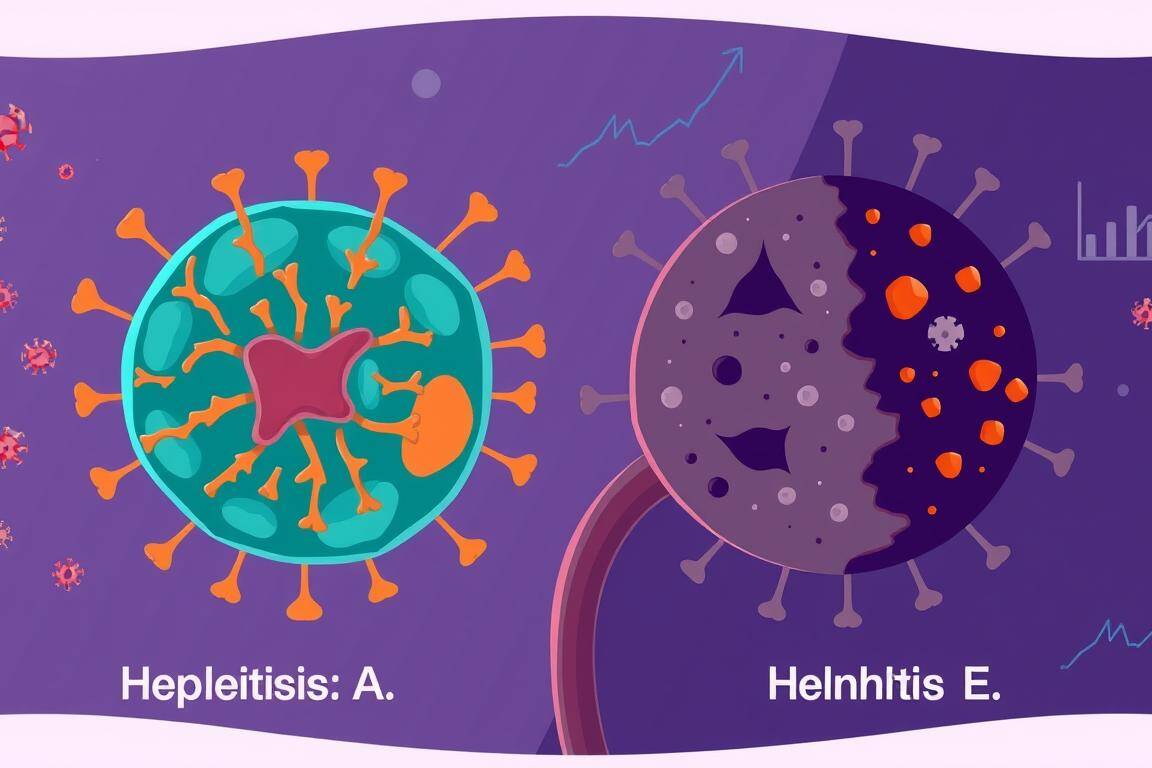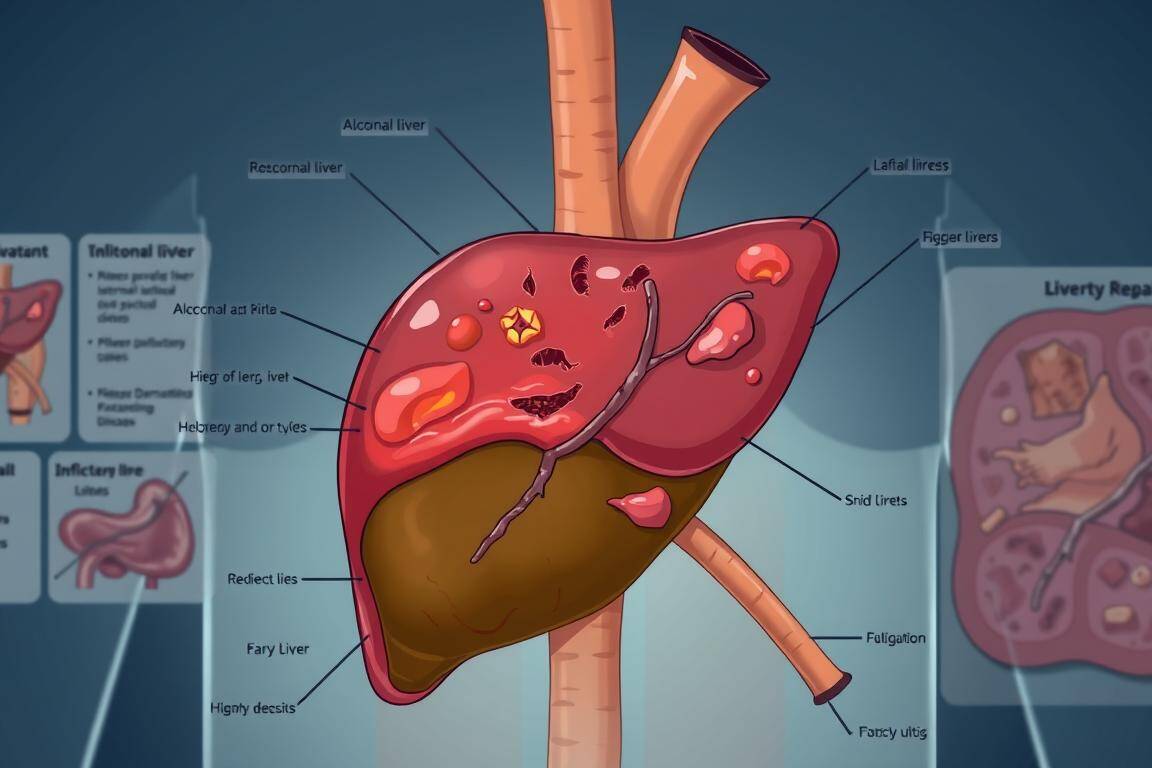Finding the right treatment for hepatitis C can seem hard. But, with Dr. Nivedita Pandey’s help, you can find the best treatment. She is a top doctor with over 20 years of experience. She knows all about the latest treatments for HCV.
Table of Contents
ToggleThis guide will show you the different ways to treat hepatitis C. You’ll learn about medicines like sofosbuvir and ledipasvir. Also, how to keep an eye on your liver health during treatment. Dr. Pandey’s advice will help you make smart choices and get better.
Dealing with hepatitis C treatment can feel scary. But, with the right help, you can get better. Let’s explore the newest treatments and ways to manage this disease with Dr. Nivedita Pandey.
Understanding Hepatitis C Virus
Hepatitis C is a serious viral infection that mainly affects the liver. It is caused by the hepatitis C virus (HCV). If not treated, it can lead to chronic liver disease. Knowing about this condition is key to staying healthy and getting the right medical care.
What is Hepatitis C?
Hepatitis C is a contagious liver disease. It can be mild or serious, lasting weeks or a lifetime. The virus attacks the liver, causing inflammation and scarring. If not treated, it can lead to cirrhosis, liver failure, and cancer.
Symptoms and Diagnosis
The early signs of hepatitis C are often mild. These include fatigue, loss of appetite, and stomach pain. But, many people don’t show symptoms early on.
To diagnose hepatitis C, a blood test is used. It looks for HCV antibodies or the virus itself. If it’s positive, more tests are done to check the virus type and liver damage.
People at higher risk include those who shared needles, got blood transfusions before 1992, or have hemophilia. The CDC suggests screening all U.S. adults for hepatitis C. Many people don’t know they’re infected.

Hepatitis C Virus Treatment Options
If you have hepatitis C, there are good treatments. The main treatment uses antiviral drugs, especially direct-acting antivirals (DAAs). These drugs target the virus, stopping it from copying itself.
Antiviral Medications
Antiviral drugs are the first choice for treating hepatitis C. They help keep the virus under control and protect your liver. Some common drugs include:
- Sofosbuvir
- Ledipasvir
- Ribavirin
Direct-Acting Antivirals (DAAs)
DAAs are very effective against hepatitis C. They block the virus’s ability to copy itself. This lets your body fight off the infection. DAAs can cure over 95% of people in 8-12 weeks.
The right treatment for you depends on your hepatitis C type, liver health, and past treatments. Your doctor will help choose the best treatment for you.

The treatment for hepatitis C is always getting better. New, better drugs are coming out. If you have questions about your treatment, talk to your doctor.
Hepatitis C virus treatment
The treatment for hepatitis C follows guidelines from top health groups. These include the American Association for the Study of Liver Diseases (AASLD) and the Infectious Diseases Society of America (IDSA). They suggest the best medicines and how to watch the virus.
Treatment Guidelines
The main aim is to get rid of the virus. New medicines, called direct-acting antivirals (DAAs), work well. They have fewer side effects and treatment lasts only 8 to 12 weeks.
Monitoring and Follow-up
People getting treated will have regular blood tests. These check if the treatment is working and if there are side effects. Follow-up care is key to make sure the virus is gone for good.
Screenings for hepatitis C include blood tests to check the virus’s level and type. They also look at liver damage. People with cirrhosis should see their doctor every 3-6 months.
Those with hepatitis C should tell their partners and use condoms. Stopping alcohol and avoiding harmful medicines is also important.

Overcoming Treatment Challenges
Direct-acting antivirals (DAAs) are usually well-tolerated for treating hepatitis C. But, some people might face side effects. These can include feeling tired, having headaches, nausea, or trouble sleeping.
In some cases, patients might also see anemia or high liver enzymes. It’s important to tackle these hepatitis c treatment challenges to finish treatment well.
Doctors and patients work together to handle hepatitis c treatment side effects. They might adjust the medicine or offer support. It’s key for patients to share any issues with their doctors. This way, the team can find ways to help and ensure treatment is completed.
- Proper treatment can cure hepatitis C in most people, highlighting a high success rate of treatment options.
- Many individuals with hepatitis C experience stigma related to the disease, indicating a prevalent issue that affects those diagnosed with the condition.
- Treatment for hepatitis C can be expensive, underlining the financial burden that patients may face in accessing care.
- Injected drug users are at a higher risk of contracting hepatitis C, emphasizing a specific at-risk population that may need tailored treatment approaches.
- Substance use disorders can make it challenging to adhere to a hepatitis C treatment plan, indicating a need for simultaneous treatment for both conditions.

By working closely with healthcare providers and communicating any concerns, patients can overcome the challenges associated with hepatitis C treatment and achieve successful outcomes.
Liver Transplantation for Hepatitis C
For those with severe hepatitis C and liver damage, a liver transplant might be needed. This surgery removes the damaged liver and replaces it with a healthy one. After the transplant, patients must keep taking antiviral drugs to stop the virus from coming back.
New treatments for hepatitis C have made liver transplants more successful. Studies show almost all patients treated with these drugs after transplant get rid of the virus. Also, those who get a liver with the can also clear it from their body.
Starting treatment with these drugs soon after transplant is key. It greatly lowers the risk of serious liver damage. These drugs work very well, helping over 95% of patients in their first treatment. If the first treatment fails, they still have a high chance of success in the second try.
But, not everyone with advanced liver disease will do well with these drugs. Those with the most severe liver damage have a harder time getting rid of the virus. Some patients might still see their liver get worse, even after the virus is gone.
Liver transplant and antiviral therapy are now good options for severe hepatitis C. As treatments get better, so will the results for these patients.
Hepatitis C and Lifestyle Changes
Living with hepatitis C is more than just treatment. Healthy lifestyle changes can greatly improve your well-being. They also help your liver recover. Let’s look at the role of diet, nutrition, exercise, and stress management in managing hepatitis C.
Diet and Nutrition
Eating a balanced diet is key for those with hepatitis C. Eat lots of fruits, veggies, whole grains, lean proteins, and healthy fats. These foods support liver health and keep your body working well.
Avoid foods high in fat, sugar, and salt. They can harm your liver more. If your liver is badly damaged, your doctor might suggest special diets. This could mean less salt and protein to ease your liver’s work.
Drinking lots of water is also important. It helps with side effects of treatment like dry skin and mouth.
Exercise and Stress Management
Exercise is very good for people with hepatitis C. It helps with weight loss, mood, and fighting tiredness. Try to mix cardio like walking or swimming with strength training to stay fit.
Stress is bad for your immune system and liver. Use stress management like meditation, yoga, or counseling. Also, spend time with friends, do hobbies, and get enough sleep to feel better.
Changing your lifestyle is a big part of managing hepatitis C. Focus on a healthy diet, regular exercise, and managing stress. This helps your liver recover and improves your life quality.
Prevention and Awareness
Stopping hepatitis C spread is key, as it can harm the liver badly if not treated. There’s no vaccine yet, but regular tests and early detection help a lot.
Vaccination and Screening
The Centers for Disease Control and Prevention (CDC) says all adults 18 to 79 should get tested for hepatitis C at least once. People at high risk, like those who use needles or have been exposed to infected blood, need to get tested more often.
Over 2.4 million people in the U.S. have hepatitis C, and about a third don’t know they have it. It’s important to spread the word about hepatitis C, how it spreads, and why testing and prevention are key for everyone’s health.
- Prevalence of hepatitis C in the United States from 2017-2020: More than 2.4 million people, potentially as many as 4 million people.
- One-third of people with hepatitis C in the U.S. are unaware of their infection.
- Approximately 6% of infants born to people with HCV infection will contract hepatitis C.
- An estimated more than 67,000 new hepatitis C infections in the U.S. in 2022.
Even without a vaccine, finding and treating hepatitis C early can make a big difference. It’s vital to keep getting tested and to tell others about the dangers of hepatitis C.
Emerging Treatments and Research
The field of hepatitis C treatment is always changing. New research and treatments are being developed. Scientists are looking into new ways to treat the disease, like using more than one drug at a time.
They also want to find ways to cure the disease for good. This could mean patients might not have to take medicine forever.
A study by Guntipalli et al. in 2021 showed how common hepatitis C is worldwide. Messina et al. found out where and how common different types of the virus are. Lazarus et al. talked about a plan to get rid of hepatitis C in certain areas.
As we learn more about the virus, treatments will get better. Patients will have more options in the future. A study by Duncan et al. in 2020 looked into making a vaccine. Mattingly et al. did a study in 2020 on how much treatments cost and if they are worth it.
- Sofosbuvir/velpatasvir plus GS-9857 for 12 weeks achieved high efficacy in treatment-experienced genotype 1–6 HCV-infected patients, including those previously treated with direct-acting antivirals.
- ABT-493 and ABT-530 achieved 100% SVR12 with or without ribavirin in treatment-naïve HCV genotype 3-infected patients with cirrhosis.
- VIEKIRA PAK showed a 98%-100% SVR4 rate in HCV genotype 1 non-cirrhotic treatment-naïve or pegylated interferon/ribavirin null-responders.
- ABT-493 and ABT-530 demonstrated high efficacy in HCV genotype 1-infected patients who failed direct-acting antiviral-containing regimens.
- Sofosbuvir/velpatasvir/GS-9857 showed high efficacy for 12 weeks in direct-acting antiviral-experienced patients with genotype 1 HCV infection.
- Grazoprevir/MK-8408/MK-3682 regimen for 8 weeks achieved high efficacy in HCV genotype 1, 2, and 3-infected patients.
- RF-101, a GalNAc-conjugated oligonucleotide, resulted in significant viral load reductions in chronic hepatitis C patients with a single subcutaneous dose.
New treatments are being developed all the time. This means better chances for patients to get well and stay well. As we learn more, treatments will keep getting better.
Conclusion
Hepatitis C is a serious virus that harms the liver if not treated. But, new medicines can cure most people. These medicines, called direct-acting antivirals, work very well.
Knowing about these treatments and making healthy choices can help. This way, people with hepatitis C can get better and stay healthy. New research and medicines give us hope for better treatments soon.
Since 2015, the number of people with HCV in the UK has gone down by 47.2%. Most people in Africa who get treated for HCV get better. But, many people with HCV don’t know they have it. This shows we need to keep working on awareness and prevention.
By getting regular check-ups and making healthy choices, you can fight hepatitis C. You can take control of your health and get your liver back in shape. The research shows us the way. With new medicines coming, we can beat hepatitis C together.
FAQ
What is hepatitis C?
Hepatitis C is a viral infection that mainly affects the liver. It’s caused by the hepatitis C virus (HCV). If not treated, it can lead to chronic liver disease.
What are the symptoms of hepatitis C?
Early symptoms of hepatitis C are often mild. They include fatigue, loss of appetite, and stomach pain. Many people don’t show symptoms in the early stages.
How is hepatitis C diagnosed?
Diagnosing hepatitis C involves a blood test. This test looks for HCV antibodies or the virus itself. If it’s positive, more tests follow to check the virus type and liver damage.
What are the treatment options for hepatitis C?
Treatment for hepatitis C mainly uses antiviral medications. These are called direct-acting antivirals (DAAs). They are very effective, curing the disease in over 90% of patients.
What is the role of healthcare providers in hepatitis C treatment?
Healthcare providers help manage side effects. They might adjust medication or offer supportive care. Patients should talk to their team about any concerns or symptoms.
What happens if hepatitis C results in liver damage or cirrhosis?
Severe cases may need a liver transplant. After a transplant, patients must keep taking antiviral therapy. This prevents the virus from coming back in the new liver.
How can individuals with hepatitis C improve their overall health?
People with hepatitis C can improve their health by making lifestyle changes. Eating well, exercising regularly, and managing stress are key. Techniques like meditation or yoga can help.
How can hepatitis C be prevented?
There’s no vaccine for hepatitis C yet. But, regular screening and early diagnosis are crucial. The CDC suggests screening all adults aged 18 to 79 at least once.
What are the latest developments in hepatitis C treatment?
Hepatitis C treatment is always getting better. New research and treatments are being developed. Scientists are looking into combination therapies to improve results and reduce drug resistance.
Source Links
About The Author

Medically reviewed by Dr. Nivedita Pandey, MD, DM (Gastroenterology)
Senior Gastroenterologist & Hepatologist
Dr. Nivedita Pandey is a U.S.-trained gastroenterologist and hepatologist with extensive experience in diagnosing and treating liver diseases and gastrointestinal disorders. She specializes in liver enzyme abnormalities, fatty liver disease, hepatitis, cirrhosis, and digestive health.
All content is reviewed for medical accuracy and aligned with current clinical guidelines.
About Author | Instagram | Linkedin





